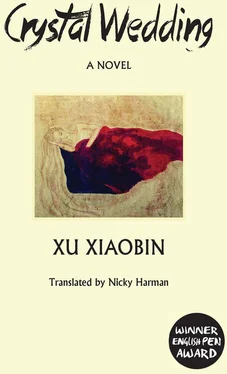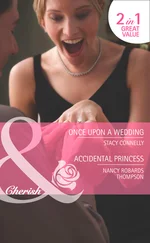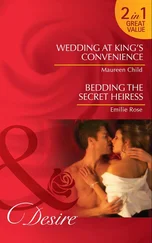Xiaobin Xu - Crystal Wedding
Здесь есть возможность читать онлайн «Xiaobin Xu - Crystal Wedding» весь текст электронной книги совершенно бесплатно (целиком полную версию без сокращений). В некоторых случаях можно слушать аудио, скачать через торрент в формате fb2 и присутствует краткое содержание. Год выпуска: 2016, Издательство: Balestier Press, Жанр: Современная проза, на английском языке. Описание произведения, (предисловие) а так же отзывы посетителей доступны на портале библиотеки ЛибКат.
- Название:Crystal Wedding
- Автор:
- Издательство:Balestier Press
- Жанр:
- Год:2016
- ISBN:нет данных
- Рейтинг книги:3 / 5. Голосов: 1
-
Избранное:Добавить в избранное
- Отзывы:
-
Ваша оценка:
- 60
- 1
- 2
- 3
- 4
- 5
Crystal Wedding: краткое содержание, описание и аннотация
Предлагаем к чтению аннотацию, описание, краткое содержание или предисловие (зависит от того, что написал сам автор книги «Crystal Wedding»). Если вы не нашли необходимую информацию о книге — напишите в комментариях, мы постараемся отыскать её.
Crystal Wedding — читать онлайн бесплатно полную книгу (весь текст) целиком
Ниже представлен текст книги, разбитый по страницам. Система сохранения места последней прочитанной страницы, позволяет с удобством читать онлайн бесплатно книгу «Crystal Wedding», без необходимости каждый раз заново искать на чём Вы остановились. Поставьте закладку, и сможете в любой момент перейти на страницу, на которой закончили чтение.
Интервал:
Закладка:
What eventually relieved her pain were the posters that appeared in the Triangle at Peking University in April. Lian always said that Tianyi was someone who thrived on chaos. As soon as the unrest started, she made a rapid recovery. Was it because she had something new to focus her energies on, she wondered? At any rate, for a while, she felt elated and spent every day at the Triangle. She was astounded at the intelligence of the posters. She felt that no one in the world understood politics like the Chinese. Every political movement threw up extraordinarily perceptive insights. For example, during the Cultural Revolution the posters that appeared on every campus had been very perceptive at the start though, sadly, the movement had quickly degenerated into bloody infighting and the students’ antics eventually dragged the whole nation down with them.
But in mid-April 1989, two decades later, politics on the university campus found far gentler and more cultured expression. One of the posters, written in the form of a traditional couplet, was a commentary on Deng Xiaoping’s attack on his former colleague, reformer and supporter of the students, Hu Yaobang. The couplet used the language of mah-jong moves and involved an intricate play on words, but there was nothing veiled about the references to the political situation and to the author’s feelings about it. There were many other similar posters, and the campus became a forum where the brightest brains of the university displayed their political and literary talents.
Riding her cranky old bicycle around the campus that day, Tianyi recalled the outbreak of the Cultural Revolution in 1966. She had only been thirteen, in the sixth grade of primary school, and none of her fellow pupils shared her enthusiasm for politics. She cycled from one school to another to see what was going on, until in December of that year, she fell ill. There was no clear diagnosis but she was in bed for three months, running a high fever. By the time she recovered, everything had changed: spring had arrived, she had suddenly grown beautiful, and she had written her first poem, entitled Enlightenment . Before the end of the year, she also got her first period.
In those days, there were no sanitary towels. Her mother looked out an old ‘sanitary pocket’ for her. It was a rectangular piece of checked cloth, with a strip of towelling sown on top of it. When no one was around, Tianyi slipped into her room with a washbowl, shut the door and washed herself. Then she tore some ordinary toilet paper into strips and stuffed the pocket with them. She was scared. She had seen the way women walked up and down the street and did not want to end up looking that way. She was grateful that after three or four days, the bleeding stopped and she felt like a girl, playing the usual boisterous games with Di and Xian. The dread returned, however, with another period the next month and accompanied her as she grew up and began to walk like those other women she saw in the street.
On one of those brilliantly sunny spring days in 1989, she received a phone call from Zheng. Once more, his voice dispelled her angst and turned the day bright again. ‘Tianyi, we’re in the Square! Come and join us!’ His voice also seemed to turn the clock back, to turn them back into the young man and woman they had been all those years ago, unmarried, without children, when they had lived their individual lives, belonging only to themselves.
That day, Tianyi put the phone down and got on her bike. Zheng’s voice had succeeding in soothing the pain from her wound, and she pedalled speedily along, leaving the other cyclists far behind. Ever since she was a girl, she liked to ride fast. It had frightened her mother and father.
That day, the students who had marched into Tiananmen Square were from Zheng’s university. Everyone knew him and many stepped out of the march to greet him. Before Tianyi’s very eyes, he was transformed back into that brilliant, handsome youth she had once known and loved.
Tianyi was very late home that day. Lian and Niuniu were both asleep, but Lian threw on some clothes and came out to say: ‘Your mother called. Your aunt and uncle have arrived from Taiwan, can you go over tomorrow.’ Then he got back under the covers and was asleep. He had scarcely opened his eyes to talk to her. He liked his sleep, for sure, but this was different. He was secretly very angry, Tianyi knew, and did not want to look at her. His resentment had built up over a long period, and was seeking an outlet. The outburst would not come right now — the middle of the night was when he was at his least belligerent — but come it surely would, when he had bolstered his strength.
Tianyi lay in the single bed in her little study, overwhelmed with excitement, unable to sleep. All she wanted to do was to share today’s excitements with someone, but she knew it would not be with Lian.
Next day, Tianyi’s eyes welled with tears when she saw her Taiwan uncle and aunt for the first time. The pair looked so frail and old. But what moved her most was the way her uncle was so clearly devoted to his wife and attentive to her needs. Her mother told her how, when her sister had married him, their parents had feared that he would turn out to be a philanderer. Her uncle had been an up-and-coming airforce officer in the Kuomintang, romantically handsome, while her aunt was the least good-looking of the sisters and girl cousins in their family, in fact she was frankly ugly. But the parents had no cause to worry.
Her uncle held himself erect, like the soldier he had once been. He hurried back and forth, bringing water and a towel, and wiped his wife’s face. Her aunt had had a stroke two years before, and her mouth was still lopsided. The two of them were fond of children, and immediately took to Niuniu, whom Tianyi had taken with her. Niuniu saw the piles of toys they had brought him and was wild with excitement. He was a solitary child who had few other children to play with, being the only child in the family as yet, so he was thrilled when all the assembled adults vied to pet and spoil him.
The size of Xiaolan’s belly was alarming; her face was puffy too and her heavily-pencilled eyebrows crawled across it like a couple of black snakes. Pregnancy had given her a voracious appetite for deli-style food like soy-stewed pigs’ trotters and kebabs. Tianke went out every day, determined to find her what she liked. Tianyi, watching her eat her way through mountains of meat, felt her gorge rise.
Lian went out of his way to please the old folks, producing his party piece, stir-fried shredded eel in sizzling oil. Tianyi’s uncle and aunt were greatly touched by his efforts. The trouble was that Xiaolan demolished half the dish, so Tianyi, embarrassed for her, hurried off to make an extra soup.
Tianyi’s mother was talking about their youth when their family had fled the turmoil of war, arrived in Hankou and had had to rely on her sister’s husband’s family for hand-outs. Tianyi had always found it hard to understand how the older generation were related. This story shed some light on it: her aunt was her mother’s older cousin, not her birth sister. Tianyi’s maternal grandmother was the wife of her aunt’s father’s younger brother. Her mother also had a brother, now dead, who was her aunt’s younger cousin. To tell the truth, before Tianyi met her uncle and aunt, she had heard nothing but negative things about that side of the family. Her mother used to say that when she and her family fled to Hankou, her own mother had given her brother-in-law a lot of silver dollars, while the rest of the family got only a little food. Tianyi’s mother’s brother did not even get enough to eat. The old woman had stored valuables at the brother-in-law’s house, and that branch of the family never gave them back. And so on and so forth. Tianyi’s mother had a poor opinion of Tianyi’s uncle as well — but then she had an extremely sharp tongue. Anyone she approved of must be a saint. As she listened to the stories of the old folks’ lives, what most moved Tianyi was the story of her mother’s brother and the Taiwan uncle: the brother had been separated from the others, and went down with cholera as they fled the battle zone. It was the Taiwan uncle, at that time the youngest officer in the Kuomintang airforce, who had come to the rescue, carrying the sick man on his own back to the best hospital he could find. When mother and daughter talked of these things afterwards, both were always reduced to tears, and the child Tianyi along with them.
Читать дальшеИнтервал:
Закладка:
Похожие книги на «Crystal Wedding»
Представляем Вашему вниманию похожие книги на «Crystal Wedding» списком для выбора. Мы отобрали схожую по названию и смыслу литературу в надежде предоставить читателям больше вариантов отыскать новые, интересные, ещё непрочитанные произведения.
Обсуждение, отзывы о книге «Crystal Wedding» и просто собственные мнения читателей. Оставьте ваши комментарии, напишите, что Вы думаете о произведении, его смысле или главных героях. Укажите что конкретно понравилось, а что нет, и почему Вы так считаете.












